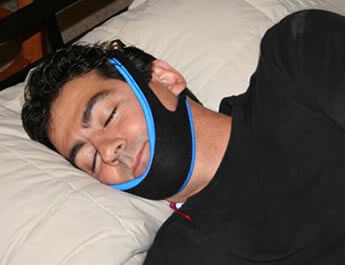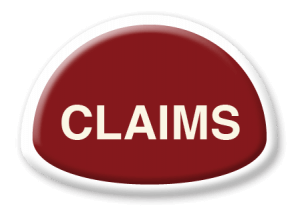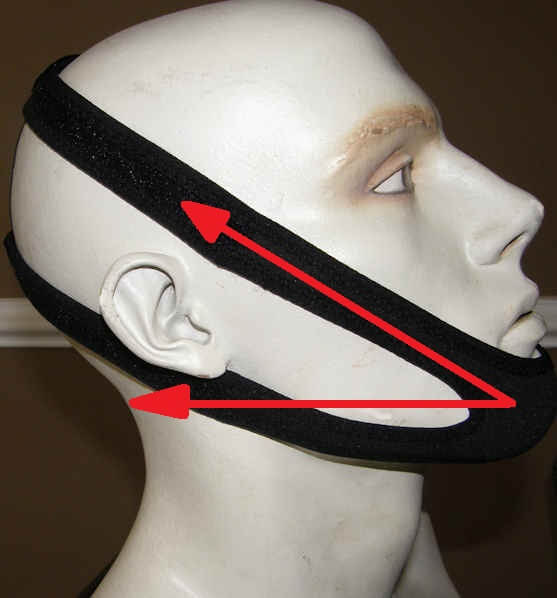 While searching for a stop snoring solution, you may have encountered a few manufacturers who are selling chin straps that promise a better night of sleep and an end to your snoring. Can a chinstrap really help to prevent snoring? This is an excellent question that deserves a thoughtful answer.
While searching for a stop snoring solution, you may have encountered a few manufacturers who are selling chin straps that promise a better night of sleep and an end to your snoring. Can a chinstrap really help to prevent snoring? This is an excellent question that deserves a thoughtful answer.
Exactly what is a snoring chinstrap?
Most snoring chinstraps, also known as snore belts, are made from an elastic material such as neoprene or nylon. They cradle the jaw and then wrap around the rear upper portion of the head. In some cases, a strap will also wrap around the rear of the head just behind the ears.
Before going to bed, the snorer places the strap around their chin and then stretches it behind their head. Resistance caused by the elastic material holds the device in place.
There are a number of similar products that are currently being sold under the following names:
- My Snore Solution
- Snore Silencer
- Locared Snore Stopper Strap
- Medex Snore Belt
- Avalon Aire
- Snore Eliminator Pro
- EZ Sleep
- SnorEVADER
- SnoreSheild
- Stop Snoring Jaw Strap
- SleepPro Stop Snoring Chinstrap
In addition to these products, there are also over a dozen manufacturer who sells an identical product for CPAP and BiPAP users including Philips Respironics, North American Healthcare, Resmed, AG Industries, as well as several others.
The claim
 Exactly how does a simple elastic strap stop snoring in its tracks? While claims vary slightly from one manufacturer to another, most manufacturers suggest that the sound of snoring is eliminated by holding the jaw forward and closed. If snoring comes from the mouth then sealing up the source of those pesky sounds should eliminate the problem, right?
Exactly how does a simple elastic strap stop snoring in its tracks? While claims vary slightly from one manufacturer to another, most manufacturers suggest that the sound of snoring is eliminated by holding the jaw forward and closed. If snoring comes from the mouth then sealing up the source of those pesky sounds should eliminate the problem, right?
A close examination of the claims
Claim #1: A chinstrap holds the lower jaw forward and opens the airway

A chinstrap forces the lower jaw up and then back.
Many experts suggest that snoring (and often obstructive sleep apnea) is often caused by a blockage of the airway. This blockage may be the result of excessive fatty tissues in the airway, the uvula, enlarged tonsils, the soft palate, or a number of other factors.
When a snorer falls asleep, muscles and tissues around the airway will naturally relax and become loose. As air passes in and out of the airway, these relaxed tissues will flap against each other and cause snoring sounds. In some cases, the airway will completely collapse causing what is referred to as sleep apnea.
Numerous medical studies suggest that holding one’s jaw slightly forward may help to open the airway just enough to prevent the sound of snoring. While several contraptions have been created to perform this task, the mandibular advancement devices are perhaps the most commonly used product on the market today.
A Mandibular Advancement Device (MAD) is simply a mouthpiece (similar to a night guard or a sports guard) that has an upper and lower tray. The lower tray is positioned slightly in front of the upper. In most cases, the lower tray can be adjusted in small increments to accommodate an individual’s needs. It’s placed in the mouth before going to sleep and helps to hold the jaw forward and airway open.
Having a basic understanding of the simple physics of the chinstrap makes it easy to identify the issue with the first claim. A chinstrap exerts force up and then back, not forward. It simply does not hold the jaw forward. It may actually position the jaw further back, which can create further issues.
“Claim #2: A chinstrap holds the mouth closed which prevents snoring
It’s a common belief that holding the jaw closed will prevent snoring. From a practical standpoint, this notion makes sense. After all, many who snore do so with their mouth open. It seems as if the simple solution is to strap the jaw shut and the problem goes away. Right?
Unfortunately, strapping the jaw shut does not address the underlying issue which is often a restricted airway. In some cases, one may even have a blockage in the nasal cavity caused by a polyp, a deviated septum, or inflammation which restricts or completely blocks airflow through the nose. If a nasal blockage occurs, the body will naturally resort to breathing through the mouth. Forcing the mouth closed with a restricted nasal cavity is of course not a good idea.
 Without addressing the underlying issue, snoring will still occur. The sounds of snoring will transmit through the throat and nasal area.
Without addressing the underlying issue, snoring will still occur. The sounds of snoring will transmit through the throat and nasal area.
Amazon reviews on the snoring chinstrap
Several reviewers on Amazon have confirmed the ineffectiveness of various chinstrap devices by leaving similar reviews:
“This product did not reduce my snoring. In fact, my wife tells me that my snoring was worse while wearing this strap”
“Did the opposite for me, pushing my lower jaw back further, restricting air passage more, snoring more.”
“I have now used the product for four nights and, unfortunately, it is doing very little, if anything at all, to control my snoring.”
I bought this hoping it would help. It does keep my mouth shut but I continue to snore and it is just a stranger sound. Very disappointed.”
How much do they cost?
 The cost of a snoring chin strap seems to vary substantially from one manufacturer to another while the overall design of each is very similar. On the less expensive side, a chin belt is purchased for around $7.00. The more expensive chinstraps will set you back about $120.00. These prices do not include shipping costs.
The cost of a snoring chin strap seems to vary substantially from one manufacturer to another while the overall design of each is very similar. On the less expensive side, a chin belt is purchased for around $7.00. The more expensive chinstraps will set you back about $120.00. These prices do not include shipping costs.
However, on average, one should expect to pay approximately $15 plus shipping for a snore belt.
Using a chinstrap along with a CPAP or BiPAP
It’s fairly safe to say that a chinstrap that is used to prevent snoring is counterproductive and in some cases may be harmful. Is there an appropriate application where such a product can be used?
Earlier, I briefly mentioned that chinstraps are often used by CPAP and BiPAP users. It’s common to see CPAP and BiPAP users who use a chinstrap in conjunction with their machine. A strap can hold the jaw closed while wearing a nasal mask or nasal pillow mask. The idea of using the two together should of course first be discussed with one’s doctor.
So are snoring chinstraps a scam?
 By now you may be wondering if snoring chin straps are a scam. As discussed, they seem to serve no purpose when it comes to controlling snoring. In addition, there is an overwhelming amount of negative feedback spanning the internet concerning the ineffectiveness of this product.
By now you may be wondering if snoring chin straps are a scam. As discussed, they seem to serve no purpose when it comes to controlling snoring. In addition, there is an overwhelming amount of negative feedback spanning the internet concerning the ineffectiveness of this product.
Headgear that is used to keep the mouth closed during CPAP use can be effective. However, such products when used alone appears to serve no purpose when it comes to controlling snoring. No reputable studies have concluded that a chinstrap alone is an effective means that can be used to control snoring.
The importance of understanding the cause of snoring
 Now that it’s understood that snoring chinstraps are ineffective and can do more harm than good, what can you do about this bothersome bedroom habit?
Now that it’s understood that snoring chinstraps are ineffective and can do more harm than good, what can you do about this bothersome bedroom habit?
Before searching for a solution, one should begin by identifying the cause of their snoring. This requires the assistance of a trained medical professional. It’s important to note that not all snoring is simple snoring. In some cases, it can be an indicator of a more serious medical condition such as sleep apnea.
Your doctor will ask a series of question and may refer you to a specialist who will likely perform several tests. He or she will then confirm whether you simply snore or have a more serious medical condition.
Real solutions to snoring
 Perhaps you have been told by your doctor that you simply snore. What options do you have?
Perhaps you have been told by your doctor that you simply snore. What options do you have?
One easy solution may be to change your sleeping position. This is sometimes the easiest way to help reduce the sound of snoring. Another more aggressive approach is to undergo a surgical procedure such as the Pillar Procedure. Surgery should, of course, be one of the last options to should consider.
If you are searching for a simple and affordable gadget that actually works in most cases, a snoring mouthpiece may be worth looking into. I own many of these and have written several product reviews. There are also several mouthpieces that can be professionally fitted by your dentist. Professionally fitted mouthpieces are often much more expensive in comparison to boil and bite at home types but can last for several years when properly cared for.
Share This Post: